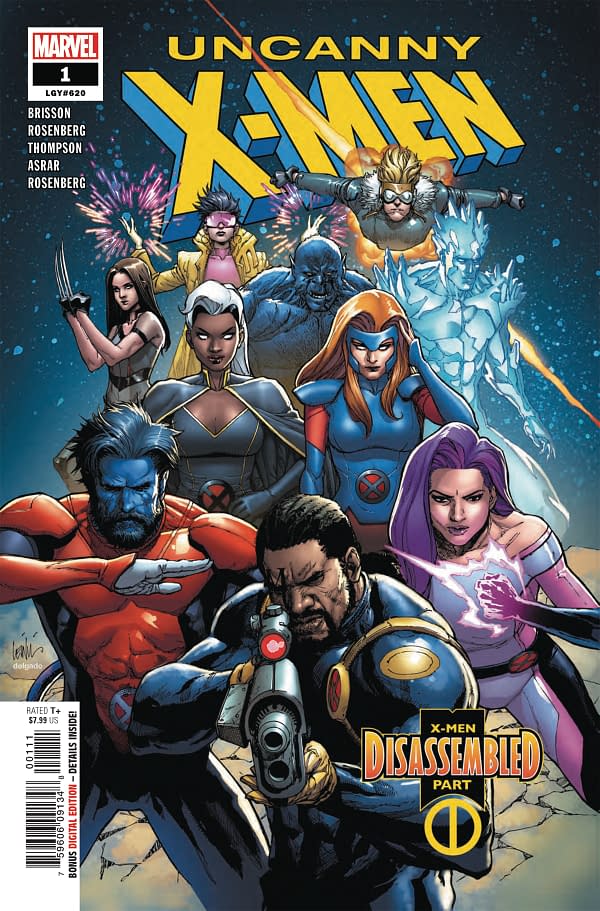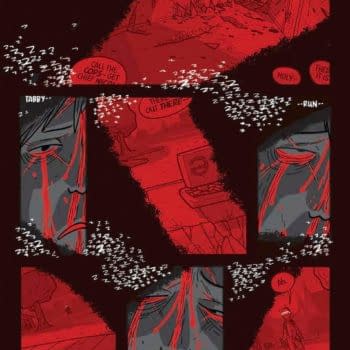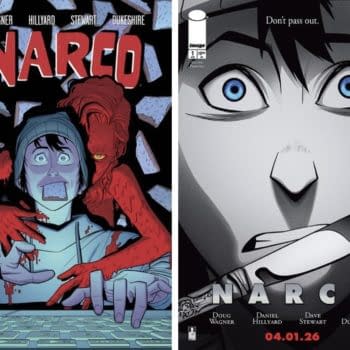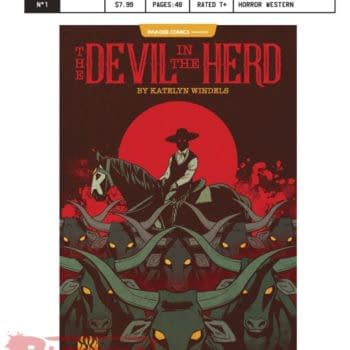Posted in: Comics | Tagged: Comics, die comics die, kelly thompson, marvel, x-men
Marvel's Kelly Thompson Says Recent $8 X-Men Comics Are a "Good Value Per Page" — But Are They?
Kelly Thompson is the writer of the excellent Mr. and Mrs. X, co-writer of the first ten issues of the recent Uncanny X-Men relaunch, and writer of West Coast Avengers and Captain Marvel at Marvel Comics. She's also proven herself to be devoted to her fans, diligently interacting on Twitter and doing things like posting #XMenMonday tweets even when no one else will. So it's no surprise that when a fan reached out on Twitter to complain about the recent overpriced issues of Uncanny X-Men, such as Uncanny X-Men #11 which hit stores today, Thompson was the first person to respond.
Here's what she had to say:
https://twitter.com/79SemiFinalist/status/1093252214225698816
What Thompson claims is mathematically correct. 60 pages of story for 8 dollars works out to 13 cents per page, while a regular issue containing 20 pages of story for 4 dollars works out to 20 cents per page. Whether either is truly a "good value" is more subjective. In the case of X-Men Disassembled, the weekly story that ran through the first ten issues of the Uncanny X-Men relaunch, a reader needed to purchase all 10 issues to get the complete story. With Uncanny X-Men #1 costing 8 bucks, Uncanny X-Men #10 costing 5 bucks, and everything in between costing 4 bucks, that works out to a 45 dollar investment just to read one story which itself leads into the Age of X-Man event, which will require the purchase of a one-shot and 6 ongoings to read the entire thing.
What else could you get for that price? 45 bucks could easily buy you two brand new hardcover novels or 4-5 paperback novels, a full-length video game (but not right after release), or 2-3 recent Blu Ray movies. It could fund 4 months of a Netflix or Hulu subscription, offering unlimited binge-watching of countless hours of movies and TV shows, or 4 months of Marvel Unlimited, with access to over 20,000 recent and classic comic books. You could even get an all-day pass to many theme parks for that price or less. Any of those products is likely to provide a better value per entertainment minute if one assumes that reading a comic book page takes no more than one minute each (and that's being generous these days with modern layouts), and thus reading all 250 pages of story will take a little over 4 hours at most.
The continuing story in Uncanny X-Men will, at least judging by the page count on Amazon's trade paperback listing, consist of 5 issues, published bi-weekly. The first is, once again, $8, and the subsequent four issues will presumably cost $4 each. That's $24 for a single 120-page story which will take roughly two hours to read. Could you get more hours of entertainment for $24? You almost certainly could.
Of course, it's hard to put a price on the intrinsic value of building and maintaining a comic book collection, the sense of community that comes along with it, and the value of re-reading the issues months or years later with the new context of additional stories added on. But it's also true that double or quadruple shipping comics at even $4 per page does raise the barrier of entry to that community, something which doesn't just hurt readers but the entire comic book industry itself. When a comic book series is a regular budgetary concern rather than an impulse buy, it's a lot less likely that new readers will try them out and become new comic book fans.
But Thompson isn't unaware of any of this, nor, as she points out, is any of it under her control or the control of any of the creators who actually make the comics. Comic book creators produce stories and art, but the venue for that art is mass-produced consumer products whose rights are owned by Disney and Warner Bros. Comic book creators are both irreplaceable creative geniuses and expendable cogs in the machine simultaneously, and thus, we must apologize for using her tweets as a launching pad for this rant. We acknowledge that none of this is within her control or the control of the other creators who work at Marvel, and we really do appreciate the stories they tell with our favorite characters within what we find to be a deeply flawed system.
Thompson continued:
https://twitter.com/79SemiFinalist/status/1093253208569405440
Marvel, and the superhero-industrial complex in general, do set the page counts, pricing, and publication schedules, but they've also backed themselves into a corner when it comes to flexibility. Decades of concentrating on selling comics to the direct market and squeezing more and more money out of a smaller audience with higher prices, variant covers, super-mega-crossover event tie-ins, and #1 issue relaunches rather than attempting to build an exponentially larger audience through lower prices, widespread availability, and accessible continuity has become a self-perpetuating cycle where the only answer to declining sales is to offer more of the same and hope nobody has caught onto the gimmickry. The quality of the comics themselves, which can vary but is generally pretty high in terms of entertainment, is secondary when it comes to profits.
We've been talking about this stuff for nearly a decade at this point, at The Outhouse (R.I.P.) since 2011 and here since 2017, and over that time the prices have gotten higher, the relaunches and events have become more frequent, and aside from the occasional Walmart type venture, direct market comic book shops are still the primary venue for selling superhero comics. The readership of monthly superhero comics has stagnated at best over that same time period, or declined, depending on how you read the Diamond tea leaves. It would be reasonable to conclude in that case that complaining about it is a futile effort and that comics will either eventually evolve into something more like the young readers market that dwarfs superhero comic book floppies in sales units and readership, or it will eventually be seen as a pointless endeavor entirely by the global megacorps which own the largest superhero comic book publishers and simply shut down or outsourced to smaller publishers while they continue to profit off the intellectual property in more lucrative mediums.
Either way, the fact is that we as readers don't really have any say in the matter. We can buy the comics at whatever price, page count, and publishing schedule Marvel (or DC) decides to sell them at, or we can not buy them, but the evidence shows that the industry will simply get the readers who stick around to pay more per issue or buy more variants to make up for it.
So are 8 dollar comics, or 4 dollar comics, a good value per page? That's actually the wrong question. A better one is: does it matter?
Your thoughts in the comment section would be appreciated.
















